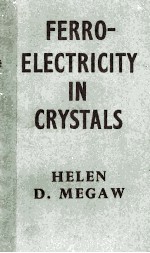图书介绍
FERROELECTRICITY IN CRYSTALS2025|PDF|Epub|mobi|kindle电子书版本百度云盘下载

- HELEN D. MEGAW 著
- 出版社: METHUEN AND CO LTD.
- ISBN:
- 出版时间:1957
- 标注页数:220页
- 文件大小:51MB
- 文件页数:226页
- 主题词:
PDF下载
下载说明
FERROELECTRICITY IN CRYSTALSPDF格式电子书版下载
下载的文件为RAR压缩包。需要使用解压软件进行解压得到PDF格式图书。建议使用BT下载工具Free Download Manager进行下载,简称FDM(免费,没有广告,支持多平台)。本站资源全部打包为BT种子。所以需要使用专业的BT下载软件进行下载。如BitComet qBittorrent uTorrent等BT下载工具。迅雷目前由于本站不是热门资源。不推荐使用!后期资源热门了。安装了迅雷也可以迅雷进行下载!
(文件页数 要大于 标注页数,上中下等多册电子书除外)
注意:本站所有压缩包均有解压码: 点击下载压缩包解压工具
图书目录
1.INTRODUCTION1
1.Dielectric hysteresis1
2.The Curie point4
3.Dielectric constant5
4.Crystal symmetry and the existence of spontaneous polarization6
5.Dipole moment and dipoles8
6.Nature of transition at the Curie point:pseudosymmetric structures10
7.Twinning and domain formation12
8.Other materials13
9.Summary of properties of ferro-electries;definition14
10.Antiferroelectrics15
11.Relation between ferroelectrics and antiferroelectrics:line and cone ferroelectrics16
12.Polymorphism in ferroelectric and antiferroelectric materials;'multiple structures',sub-cells and superlattices18
13.Paraeleetrics18
2.ROCHELLE SALT20
1.Orthorhombic crystal structure20
2.Evidence for monoclinic symmetry,and location of hydrogen atoms24
3.Chemical discon-tinuity at the Curie point27
4.Isomorphous substances27
5.Curie points and effects of pressure27
6.Thermal expansion and change of lattice parameters28
7.Specific heat29
8.Dielectric constant30
9.Spontaneous polarization and coercive field31
10.Barkhausen jumps and Weiss domains:pyroelectric effect32
11.Discussion:mechanism of the transition33
3.THE TETRAGONAL PHOSPHATES35
1.Introduction:potassium dihydrogen phosphate35
2.Crystal structure at room temperature35
3.Low-temperature structure39
4.Domain texture43
5.Isomorphous substances44
6.Ammonium salts45
7.Lattice parameters and thermal expansion47
8.Specific heat and entropy48
9.Spontaneous polarization and coercive field50
10.Effect of field on crystal structure52
11.Dielectric constant53
12.Discussion:nature of transition54
4.BARIUM TITANATE58
1.Introduction58
2.Cubic(high-temperature)structure58
3.Tetragonal structure59
4.Orthorhombic structure;choice of axes of reference62
5.Rhombohedral structure64
6.Hexagonal barium titanate65
7.Cell dimensions and thermal expansion65
8.Twinning and domain texture;twin laws,X-ray and optical evidence67
9.Optical properties70
10.Latent heat,specific heat,and change of entropy71
11.Spontaneous polarization and coercive field73
12.Pyroelectric effect73
13.Dielectric constant73
14.Changes in the Curie point:effects of pressure,solid solution,and biassing field77
15.Domain boundaries and effect of field79
16.Nature of transition80
5.THE PEROVSKITE FAMILY83
1.Introduction:Goldschmidt's rules for ionic structures,and classi-fication of the perovskite family83
2.Titanates of alkaline earth metals89
3.Zirconates and hafnates of alkaline earth metals92
4.Niobates and tantalates of sodium,potassium,and rubidium93
5.Lithium niobate type103
6.Tungsten trioxide106
7.Lead titanate108
8.Lead zirconate111
9.Lead hafnate112
10.Solid solutions of lead compounds114
11.Lead compounds:summary120
6.DISCUSSION OF DISTORTED PEROVSKITE STRUCTURES124
1.Introduction:two types of distortion124
2.Packing distortion or crumpling:tilting of octahedra124
3.'Off-centre'distortion:role of covalent bonds126
4.Behaviour of lead compounds130
5.Relation of dis-tortion to ferroelectricity and antiferroelectricity131
6.Multiple cell:relation to electrical properties133
7.Summary133
7.MISCELLANEOUS STRUCTURES135
1.Introduction135
2.Double tartrates of lithium135
3.Guanidine alu-minium Sulphate hexahydrate137
4.Lithium niobate(referred to perovskite family)137
5.Periodates137
6.Pyrochlore group:cadmium niobate and isomorphous compounds142
8.THEORIES OF FERROELECTRICITY:THE PHENOMENOLOGICAL APPROACH150
1.Introduction:comparison of phenomenological and model theories150
2.Devonshire's theory of barium titanate151
3.Mueller's theory of Rochelle salt160
4.Comment on the phenomenological theories161
5.Phenomenological theory of antiferroelectricity:exist-ence of'mixed states'(cone ferroelectrics)162
9.MODEL THEORIES:GENERAL BACKGROUND165
1.Introductory ideas:origin and nature of dipoles;long-range and short-range forces165
2.Polarization and susceptibility in terms of long-range forces166
3.The internal field168
4.Polarizability:Clausius-Mosotti relation;additivity of polarizabilities of atoms;electronic and ionic polarizabilities170
5.Construction of a model theory:necessary postulates176
l0.MODEL THEORIES:PARTICULAR APPLICATIONS179
1.Introduction179
2.Rochelle salt:theories of Kurchatov and of Fowler179
3.Mason's theory of Rochelle salt179
4.Slater's theory of potassium dihydrogen phosphate183
5.Mason's treatment of potassium dihydrogen phosphate186
6.Pirenne's theory of potassium dihydrogen phosphate187
7.Mason and Matthias's theory of barium titanate188
8.Devonshire's model-theory of barium titanate:potential energy of atom191
9.Slater's theory of barium titanate:relation to Devon-shire's treatment of ionic and electronic polarizabilities,and field factor192
10.Jaynes's mechanical-deformation treatment of barium titanate197
11.Jaynes's electronic theory of barium titanate197
12.Structural approach:postulates and outline of treatment in terms of short-range forces199
APPENDIX:GLOSSARY OF CRYSTALLO-GRAPHIC TERMS203
INDEX212
热门推荐
- 2629385.html
- 1842864.html
- 3703467.html
- 1155014.html
- 556362.html
- 2940296.html
- 2148780.html
- 689377.html
- 2104823.html
- 2566608.html
- http://www.ickdjs.cc/book_1801468.html
- http://www.ickdjs.cc/book_1932882.html
- http://www.ickdjs.cc/book_3733046.html
- http://www.ickdjs.cc/book_2756014.html
- http://www.ickdjs.cc/book_3486533.html
- http://www.ickdjs.cc/book_1154467.html
- http://www.ickdjs.cc/book_3069393.html
- http://www.ickdjs.cc/book_597353.html
- http://www.ickdjs.cc/book_2570831.html
- http://www.ickdjs.cc/book_2756737.html